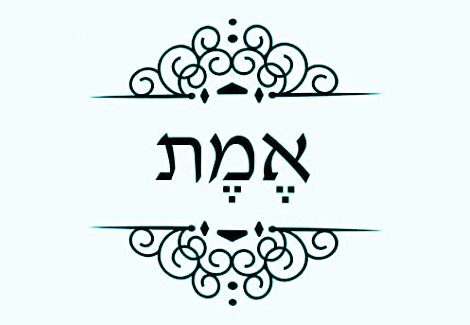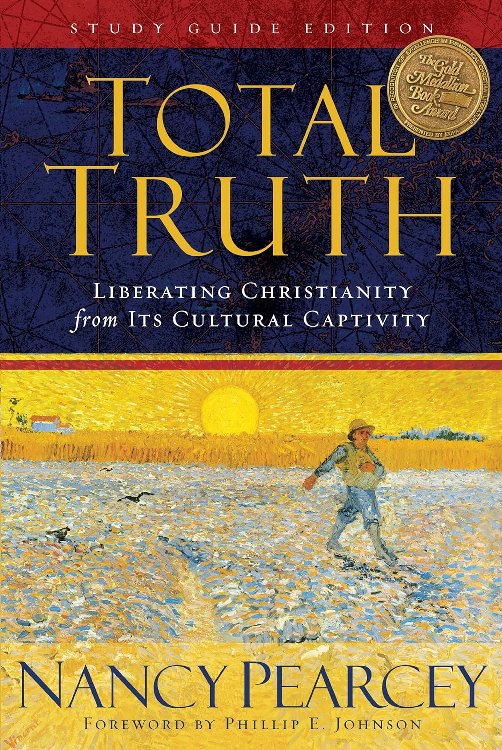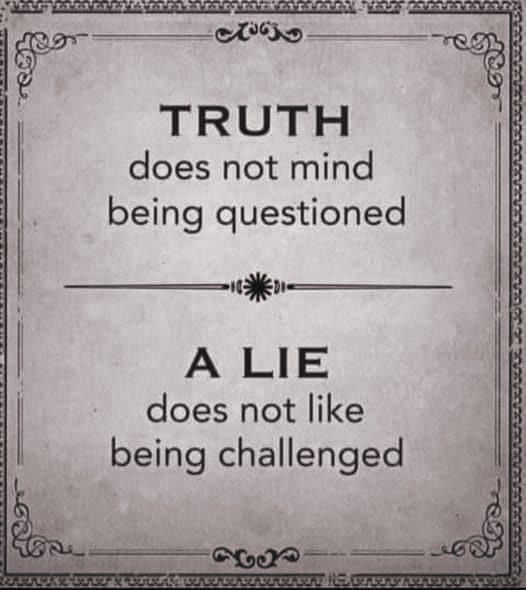RESOURCES
5-144000
A
B
C
D
E
F
G
H
I
J
K
L
M
N
O
P
Q
R
S
T
U
V
W
Y
Z
|
|


Emet - Truth - like its relation Knowledge (yada), is used in the Tanakh (Old Testament) in two senses:
- 1. The intellectual, of facts which may be ascertained to be true or false (Dt.17:4; 1 Ki.10:6); or (far more commonly),
- 2. The existential and moral, of truth as the attribute of a person.
Joseph's brothers were detained in prison "that your words may be tested to see whether there is any truth in you" (Gen.42:16, NKJV), in other words, whether they are dependable, consistent, certain, firm, of reliable character.
It is significant that of the Hebrew words translated 'truth' (emet, emunah), that the latter is also sometimes rendered "faithful[ness]" (Dt.32;4, RSV, NRSV, ESV; Hos.2:20) showing that the two concepts are closely related (compare with "amen" which is related to the same root meaning).
The Tanakh (Old Testament) thinks much more of the basis of truth in a reliable person than the mere facts of the case. This reliability is basically an attribute of Elohim (God) (Ps.31:5; Jer.10:10), whose truth "reaches to the clouds" (Ps.108:4, NKJV) and who "who keeps truth (faithfulness) forever" (Ps.146:6, NKJV). Yahweh, the Elohim (God) of the Bible, is thus very far removed from the capricious pagan deities. He is true, in other words, he is consistent, both in His loving care for His children (Gen.32:9ff.) and in His implaccable hostility against sin (Ps.54:5).
This is is no far cry from truth as an attribute of Elohim (God) Himself to one of His activity. So He judges truly (Ps.96:13), and sends truth forth (Ps.57:3). His davar (word) is true in the sense that it is permanently valid. "As You are truth, so is Your davar (word) truth, for it is written, 'Your Davar (Word), O Elohim (God), stands fast in heaven (Ps.119:89)" (Exodus Rabbah on xxix). Truth is demanded of man as his response to Elohim (God) in obedience to the Torah (Law) (Ps.119:151) and in his inmost nature (Ps.51:6), and is the bedrock of all his human relationships (Ex.20:16; Dt.5:20).
In Greek literature, however, the words for truth (alétheia, aléthés, aléthinos) do not have the same personal and moral connotation. Rather, truth is intellectual. It is "the complete or real state of affairs. As in forensic language, alétheia is the state of affairs to be proved, over against the various assertions of the parties, so in the historians it is the historical state of affairs over against myth, and in the philosophers that which really is, in the absolute sense" (R.Bultmann).
In the Messianic Scriptures (New Testament) these Greek words occur commonly, and bring with them both their classical and Hellenistic Greek meanings, so that it is often an extremely delicate matter to decide which nuance predominates, a reason why it is important to consult with Aramaic versions of the New Testament in order to get the original Hebraic sense. It is possible, however, to distinguish three broad senses in which the words are used by the Greek translator, even though these may overlap:
- 1. Dependability, truthfulness, uprightness of character (the Hebrew sense predominating). This applies to Elohim (God) (Rom.3:7; 15:8) and to men (2 Cor.7:14; Eph.5:9) alike. The use of the actual word 'truth' in this sense is not common, but the thought of an Elohim (God) who can be trusted to keep His word is implicit throughout the Messianic Scriptures (New Testament);
- 2. Truth in the absolute sense of that which is real and complete as opposed to what is false and wanting (Mk.5:33; Eph.4:25). The Christian/Messianic faith in particular is the truth (Gal.2:5; Eph.1:13). Yah'shua (Jesus) claimed that He was truth personified (Jn.14:6; cp. Eph.4:21). He mediates the truth (Jn.1:17) and the Ruach haQodesh (Holy Spirit) leads men and women into it (Jn.16:13; cp.14:17; 1 Jn.4:6), so that Yah'shua's (Jesus') talmidim (disciples) know it (Jn.8:32; 2 Jn.1), do it (Jn.3:21), abide in it (Jn.8:44), and their new birth as Elohim's (God's) children rests upon it (Jas.1:18). This truth is more than a credal formula, it is Elohim's (God's) active Davar (Word) which must be obeyed (Rom.2:8; Gal.5:7).
- 3. The adjective aléthinos especially sometimes carries the 'Platonic' sense of something real as opposed to mere appearance or copy. The Messiah is thus a minister of the true tabernacle (Heb.8:2) in contrast to the shadows of the Levitical ritual (Heb.8:4ff.). In clear allusion to the words of institition of the Master's (Lord's) Supper, Yah'shua (Jesus) declares that He is the true bread (Jn.6:32,35) and the true vine (Jn.15:1), i.e. that He is the eternal reality symbolised by the bread and wine. Similarly, the true worshippers (Jn.4:23) are not so much sincere as real. Their worship is a real approach to Elohim (God) who is "spirit[ual]" (Jn.4:24), in contrast to the ritual which restricts Elohim (God) to Jerusalem or Mt.Gerizim (Jn.4:21), and which can at best symbolise and at worst distort Him.
Searching for Truth Topics
Since the Gospel, Bible and Torah are all 'truth', to provide a complete list of articles covering this subject would be impossible and effectively embrace the whole website. The register below therefore only covers a few key subject areas of a general nature and articles which specifically address what truth is and isn't. Use your browser to search NCCG.ORG articles on whatever subject matter interests you or peruse the Topical Index (left margin) on the main page.
(18 May 2021)
THE TRUTH & THE LIE
by Jean-Léon Gérôme (1896)
According to a 19th century legend, the Truth and the Lie meet one day.
The Lie says to the Truth: “It's a marvellous day today”!
The Truth looks up to the skies and sighs, for the day was really beautiful.
They spend a lot of time together, ultimately arriving beside a well.
The Lie tells the Truth: “The water is very nice, let's take a bath together!”
The Truth, once again suspicious, tests the water and discovers that it indeed is very nice.
They undress and start bathing.
Suddenly, the Lie comes out of the water, puts on the clothes of the Truth and runs away.
The furious Truth comes out of the well and runs everywhere to find the Lie and to get her clothes back.
The World, seeing the Truth naked, turns its gaze away, with contempt and rage.
The poor Truth returns to the well and disappears forever, hiding therein, its shame.
Since then, the Lie travels around the world, dressed as the Truth, satisfying the needs of society, because, the World, in any case, harbours no wish at all to meet the naked Truth.
|
Key: Art=Article | FAQ=Frequently Asked Question | Sc=Science | St=Sermonette | Occ=Occult | OB=Olive Branch | PCM=Patriarchal Christian Marriage | NCCM=New Covenant Christian Ministries | Sab=Sabbath | Sal=Salvation | 5Com=Five Commissions | AI=Apostolic Interviews | Mini=Mini Study Guide | LDS=Latter-day Saint | Sal=Salvation | Pat=Patriarchal Christian
|
ESSENTIAL READING
Pearcey passionately argues that Christianity is truth about all reality, not just religious truth, and that to keep it privatized is stripping it of the power to challenge and redeem the whole of culture.

A Review by Tim Challies
I have often lamented the overuse of the term “life-changing” amongst Christians. It is not unusual to hear people walk away from a particularly captivating sermon or conference saying “that changed my life!” The real measure and test of life change is time, for only in time will we really know what has made a significant impact on our lives. Having established that I do not use the term lightly, I would like to suggest that Total Truth by Nancy Pearcey may just be a life-changing book. As believers we collectively spend millions of dollars and countless hours reading about Christian living – making our homes better, making our families better, making our lives better, discovering our purpose, rediscovering our masculine soul or our feminine soul and so on ad infinitum, ad nauseam. There are some who love to supplement with the study of theology or church history, and those are great pursuits. But if we buy so many books and read so much, why do we dedicate so little time to examining and studying worldview? I do not mean to indict the reader and clear my own name, for in all the reading I have done, this is the first book that deals predominantly with that topic.
Total Truth is subtitled “Liberating Christianity from Its Cultural Captivity” and this is the task to which Pearcey dedicates the book. She shows how Christians have adopted a worldview that is bound and influenced by our culture, so that we now understand Christianity through a secular worldview. She teaches that the opposite needs to be true – that we need to see society through a distinctly Christian lens, allowing a Christian worldview to interpret all that we see, do and think. She says “This book will address [the hunger for a Christian worldview] and offers new direction for advancing the worldview movement. It will help you identify the secular/sacred divide that keeps your faith locked into the private sphere of ‘religious truth.’ It will walk you through practical, workable steps for crafting a Christian worldview in your own life and work. It will teach you how to apply a worldview grid to cut through the bewildering maze of ideas and ideologies we encounter in a postmodern world.” (p.17) In short, the purpose of the book is to help Christians free their faith from its cultural captivity and to see that Christianity is not merely religious truth, but is Total Truth – truth about the whole of reality. “The purpose of a worldview is to explain our experience of the world-and any philosophy can be judged by how well it succeeds in doing so. When Christianity is tested, we discover that it alone explains and makes sense of the most basic and universal human experiences.”
As a devotee of Francis Shaeffer, Pearcey borrows heavily from his writing and ideas. Most notably, she understands, as did Shaeffer, that Christians have mimicked the world in adopting a two-level worldview which she calls a fact/value split. It can be represented as follows:
VALUES
Individual Preferences
---------------------
FACTS
Binding on everyone
In the upper level are values which are mere individual preferences and on the bottom level are facts which are binding on everyone. Facts represent knowledge drawn from and proven by science and in this way they are considered objective and rational. On the other hand, on the top level are values which are considered subjective and a product of tradition. Thus are not binding beyond the individual’s conscience and are essentially irrational. They have little to say about reality. This split has pervaded all aspects of society.
The thesis of this book is “the key to recovering joy and purpose turned out to be a new understanding of Christianity as total truth – an insight that broke open the dam and poured the restoring waters of the gospel into the parched areas of life.” The first step in recovering a Christian worldview is to understand the bifurcated worldview which is inherent in our postmodern world. Having understood that we have made false disctinctions between secular and sacred, we can begin integrating our faith into every area of life so that we bear a consistent witness throughout. Politicians are beginning to come to the realization that politics is downstream from culture. In order to change the politics of our nations, we must first influence the culture, and to do that we must reclaim a Christian worldview. “Ordinary Christians working in business, industry, politics, factory work, and so on, are ‘the Church’s front-line troops’ in the spiritual battle. Are we taking seriously our duty to support them in their warfare? The church is nothing less than a training ground for sending out laypeople who are equipped to speak the gospel to the world.” That is the subject of the bulk of the book – training and sending laypeople who can share the Gospel with the world. Pearcey continually exposes those areas that have been polluted by a secular worldview and explains how Christians need to reclaim them.
After Pearcey thoroughly deconstructed our society’s postmodern worldview in the first few chapters of the book, I found I did not have as clear an idea as to how I could rebuild a Christian worldview. But perhaps this is because there are no easy answers – there is no happy W.O.R.L.D.V.I.E.W. acronym that will allow me to follow a 9-step program to worldview reconstruction. The key is to acknowledge the deficiency of holding a two-level worldview and by immersing myself in Scripture, allowing God to shape and mould me as He sees fit. A Christian worldview must necessarily flow from the study and application of God’s Word. I need to understand and believe that Christian Truth is a unified whole, equally encompassing all of life.
In reading books written by intellectuals, rather than pastors and teachers, I have often found that their theology is shaped more by the Catholic intellectuals of days past than by the Protestant theology. This is not the case for Pearcey. She strikes a good balance of praise and criticism in her presentation of Protestantism, generally defending the actions and motives of the Reformers and believers of history. Similarly she praises various Catholic scholars (such as Aquinas) for contributions they made, but is necessarily harsh when discussing their shortcomings. Throughout the book, the author maintains this important balance. It was wonderful to see that Pearcey presents significant, deep theology that clearly aligns with the Reformed understandings of the Scripture.
I am in agreement with Al Mohler who said “Total Truth is one of the most promising books to emerge in evangelical publishing in many years. It belongs in every Christian home, and should quickly be put into the hands of every Christian young person. This important book should be part of the equipment for college or university study, and churches should use it as a textbook for Christian worldview development.” Pearcey has crafted a masterpiece that is intellectually stimulating but still accessible and practical. It will challenge, motivate and change. I give it my hearty recommendation.
Messianic Evangelicals, though evangelical in their christology, go one step further than Pearcey by insisting that Protestantism itself be further reformed by incorporating with the Messianic Israelite worldview. Properly viewed, the Gospel is not so much a reformation of Catholicism but the restoration and christianisation of the Israelite nation itself. Without the Torah-based Israelite cultural framework, even if Pearcey's 'total truth' paradigm were to be successfully applied to Protestantism, there would still be a thousand-and-one denominations uncommitted to any kind of Final Gathering or planned reclocation to the Promised Land for the Millennial Reign of Christ. Indeed, even if the cultural issues were to be properly addressed, the problems caused by the idea of 'Protestantism' itself would still remain.
Pearcey, a lecturer at Houston Baptist University, comes originally from a Lutheran background and seems to view Evangelical Protestantism through Baptist lenses, and possibly some kind of neo-Calvinist set of lenses too given how strongly she identifies with her old mentor, the apologist Francis Schaeffer. Neo-Calvinism is basically an attempt to revive the movement established by Abraham Kuyper (1837-1920) in the Netherlands to establish a Calvinistic society along the lines the radical theocratic city-state of Geneva of John Calvin himself.
If this is Pearcey's view, or something like it, then Messianic Evangelicals have problems with the ultimate goal of this particular Christian worldview iteration. In all other respects, though, Pearcey's book commends itself as an admirable exposé of the secular, materialistic, naturalist, evolutionistic, atheistic worldview and contemporary Christianity's failure to offer an holistic approach approach to living, showing us why the dualistic mode not only doesn't work but is positively harmful.
There is much to be learned of benefit from Total Truth. Pearcey is a brilliant intellectual and has the ability to render complex systems of thought simpler for the benefit of the layperson. As Messianic Evangelicals we absolutely share her overall aim, made no plainer than by her first tutor, Francis Schaeffer:
"Christianity is not a series of truths in the plural, but rather spelled with a capital 'T'. Truth about total reality, not just about religious things.
"Biblical Christianity is Truth concerning total reality - and the intellectual holding of that total Truth and then living in the Light of that Truth"
- Francis Schaeffer, Address at the University of Notre Dame, April 1981
This book should become mandatory study material for all Elders and Eldresses as part of their training for the Priesthood in the School of Zaqenim. Placed within the context of Torah-obedience and coupled with the Zionic Quest as enumerated in the Olive Branch (see 'Zion' in the Short Index & Topical Guide of the first (1997) edition, pp.1060-1), Total Truth becomes an invaluable theological and philosophical resource.
CCMW
11 April 2024
|



This page was created on 18 May 2021
Last updated on 11 April 2024
Copyright © 1987-2024 NCAY - All Rights Reserved
|
|


